INTRODUCTION TO BUSINESS LAW & ETHICS.
VerifiedAdded on 2023/01/16
|6
|1880
|35
AI Summary
Contribute Materials
Your contribution can guide someone’s learning journey. Share your
documents today.
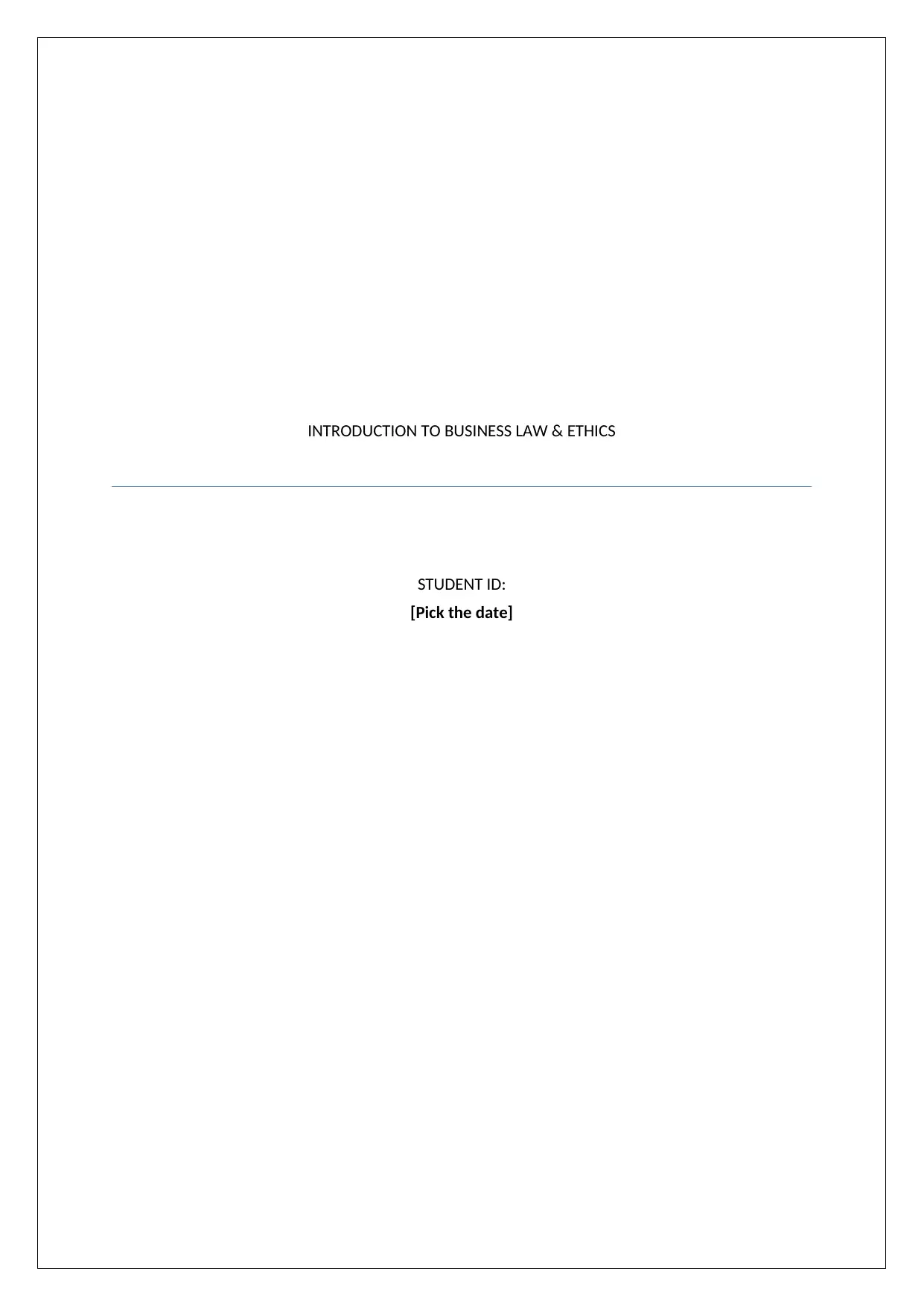
INTRODUCTION TO BUSINESS LAW & ETHICS
STUDENT ID:
[Pick the date]
STUDENT ID:
[Pick the date]
Secure Best Marks with AI Grader
Need help grading? Try our AI Grader for instant feedback on your assignments.
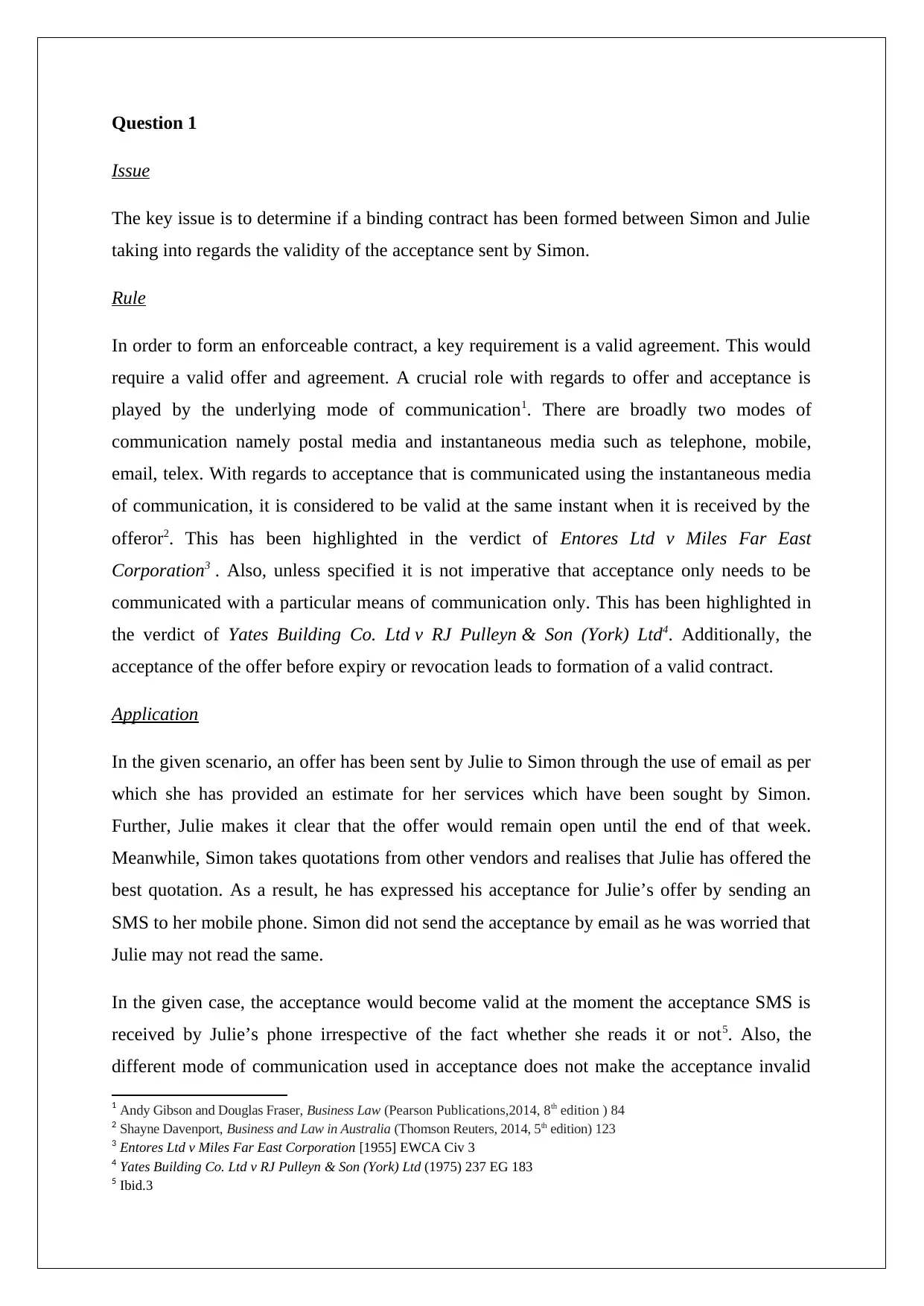
Question 1
Issue
The key issue is to determine if a binding contract has been formed between Simon and Julie
taking into regards the validity of the acceptance sent by Simon.
Rule
In order to form an enforceable contract, a key requirement is a valid agreement. This would
require a valid offer and agreement. A crucial role with regards to offer and acceptance is
played by the underlying mode of communication1. There are broadly two modes of
communication namely postal media and instantaneous media such as telephone, mobile,
email, telex. With regards to acceptance that is communicated using the instantaneous media
of communication, it is considered to be valid at the same instant when it is received by the
offeror2. This has been highlighted in the verdict of Entores Ltd v Miles Far East
Corporation3 . Also, unless specified it is not imperative that acceptance only needs to be
communicated with a particular means of communication only. This has been highlighted in
the verdict of Yates Building Co. Ltd v RJ Pulleyn & Son (York) Ltd4. Additionally, the
acceptance of the offer before expiry or revocation leads to formation of a valid contract.
Application
In the given scenario, an offer has been sent by Julie to Simon through the use of email as per
which she has provided an estimate for her services which have been sought by Simon.
Further, Julie makes it clear that the offer would remain open until the end of that week.
Meanwhile, Simon takes quotations from other vendors and realises that Julie has offered the
best quotation. As a result, he has expressed his acceptance for Julie’s offer by sending an
SMS to her mobile phone. Simon did not send the acceptance by email as he was worried that
Julie may not read the same.
In the given case, the acceptance would become valid at the moment the acceptance SMS is
received by Julie’s phone irrespective of the fact whether she reads it or not5. Also, the
different mode of communication used in acceptance does not make the acceptance invalid
1 Andy Gibson and Douglas Fraser, Business Law (Pearson Publications,2014, 8th edition ) 84
2 Shayne Davenport, Business and Law in Australia (Thomson Reuters, 2014, 5th edition) 123
3 Entores Ltd v Miles Far East Corporation [1955] EWCA Civ 3
4 Yates Building Co. Ltd v RJ Pulleyn & Son (York) Ltd (1975) 237 EG 183
5 Ibid.3
Issue
The key issue is to determine if a binding contract has been formed between Simon and Julie
taking into regards the validity of the acceptance sent by Simon.
Rule
In order to form an enforceable contract, a key requirement is a valid agreement. This would
require a valid offer and agreement. A crucial role with regards to offer and acceptance is
played by the underlying mode of communication1. There are broadly two modes of
communication namely postal media and instantaneous media such as telephone, mobile,
email, telex. With regards to acceptance that is communicated using the instantaneous media
of communication, it is considered to be valid at the same instant when it is received by the
offeror2. This has been highlighted in the verdict of Entores Ltd v Miles Far East
Corporation3 . Also, unless specified it is not imperative that acceptance only needs to be
communicated with a particular means of communication only. This has been highlighted in
the verdict of Yates Building Co. Ltd v RJ Pulleyn & Son (York) Ltd4. Additionally, the
acceptance of the offer before expiry or revocation leads to formation of a valid contract.
Application
In the given scenario, an offer has been sent by Julie to Simon through the use of email as per
which she has provided an estimate for her services which have been sought by Simon.
Further, Julie makes it clear that the offer would remain open until the end of that week.
Meanwhile, Simon takes quotations from other vendors and realises that Julie has offered the
best quotation. As a result, he has expressed his acceptance for Julie’s offer by sending an
SMS to her mobile phone. Simon did not send the acceptance by email as he was worried that
Julie may not read the same.
In the given case, the acceptance would become valid at the moment the acceptance SMS is
received by Julie’s phone irrespective of the fact whether she reads it or not5. Also, the
different mode of communication used in acceptance does not make the acceptance invalid
1 Andy Gibson and Douglas Fraser, Business Law (Pearson Publications,2014, 8th edition ) 84
2 Shayne Davenport, Business and Law in Australia (Thomson Reuters, 2014, 5th edition) 123
3 Entores Ltd v Miles Far East Corporation [1955] EWCA Civ 3
4 Yates Building Co. Ltd v RJ Pulleyn & Son (York) Ltd (1975) 237 EG 183
5 Ibid.3
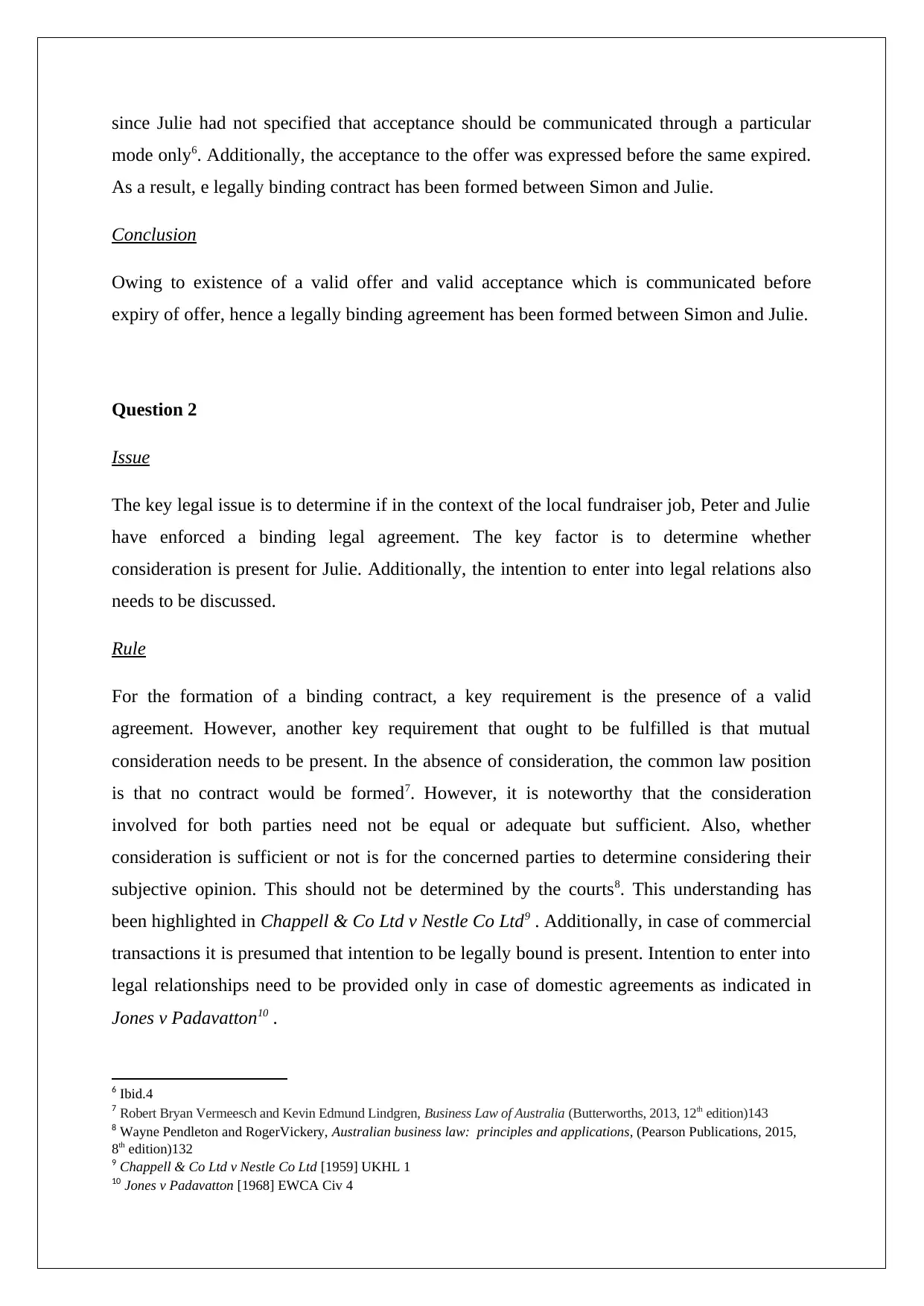
since Julie had not specified that acceptance should be communicated through a particular
mode only6. Additionally, the acceptance to the offer was expressed before the same expired.
As a result, e legally binding contract has been formed between Simon and Julie.
Conclusion
Owing to existence of a valid offer and valid acceptance which is communicated before
expiry of offer, hence a legally binding agreement has been formed between Simon and Julie.
Question 2
Issue
The key legal issue is to determine if in the context of the local fundraiser job, Peter and Julie
have enforced a binding legal agreement. The key factor is to determine whether
consideration is present for Julie. Additionally, the intention to enter into legal relations also
needs to be discussed.
Rule
For the formation of a binding contract, a key requirement is the presence of a valid
agreement. However, another key requirement that ought to be fulfilled is that mutual
consideration needs to be present. In the absence of consideration, the common law position
is that no contract would be formed7. However, it is noteworthy that the consideration
involved for both parties need not be equal or adequate but sufficient. Also, whether
consideration is sufficient or not is for the concerned parties to determine considering their
subjective opinion. This should not be determined by the courts8. This understanding has
been highlighted in Chappell & Co Ltd v Nestle Co Ltd9 . Additionally, in case of commercial
transactions it is presumed that intention to be legally bound is present. Intention to enter into
legal relationships need to be provided only in case of domestic agreements as indicated in
Jones v Padavatton10 .
6 Ibid.4
7 Robert Bryan Vermeesch and Kevin Edmund Lindgren, Business Law of Australia (Butterworths, 2013, 12th edition)143
8 Wayne Pendleton and RogerVickery, Australian business law: principles and applications, (Pearson Publications, 2015,
8th edition)132
9 Chappell & Co Ltd v Nestle Co Ltd [1959] UKHL 1
10 Jones v Padavatton [1968] EWCA Civ 4
mode only6. Additionally, the acceptance to the offer was expressed before the same expired.
As a result, e legally binding contract has been formed between Simon and Julie.
Conclusion
Owing to existence of a valid offer and valid acceptance which is communicated before
expiry of offer, hence a legally binding agreement has been formed between Simon and Julie.
Question 2
Issue
The key legal issue is to determine if in the context of the local fundraiser job, Peter and Julie
have enforced a binding legal agreement. The key factor is to determine whether
consideration is present for Julie. Additionally, the intention to enter into legal relations also
needs to be discussed.
Rule
For the formation of a binding contract, a key requirement is the presence of a valid
agreement. However, another key requirement that ought to be fulfilled is that mutual
consideration needs to be present. In the absence of consideration, the common law position
is that no contract would be formed7. However, it is noteworthy that the consideration
involved for both parties need not be equal or adequate but sufficient. Also, whether
consideration is sufficient or not is for the concerned parties to determine considering their
subjective opinion. This should not be determined by the courts8. This understanding has
been highlighted in Chappell & Co Ltd v Nestle Co Ltd9 . Additionally, in case of commercial
transactions it is presumed that intention to be legally bound is present. Intention to enter into
legal relationships need to be provided only in case of domestic agreements as indicated in
Jones v Padavatton10 .
6 Ibid.4
7 Robert Bryan Vermeesch and Kevin Edmund Lindgren, Business Law of Australia (Butterworths, 2013, 12th edition)143
8 Wayne Pendleton and RogerVickery, Australian business law: principles and applications, (Pearson Publications, 2015,
8th edition)132
9 Chappell & Co Ltd v Nestle Co Ltd [1959] UKHL 1
10 Jones v Padavatton [1968] EWCA Civ 4
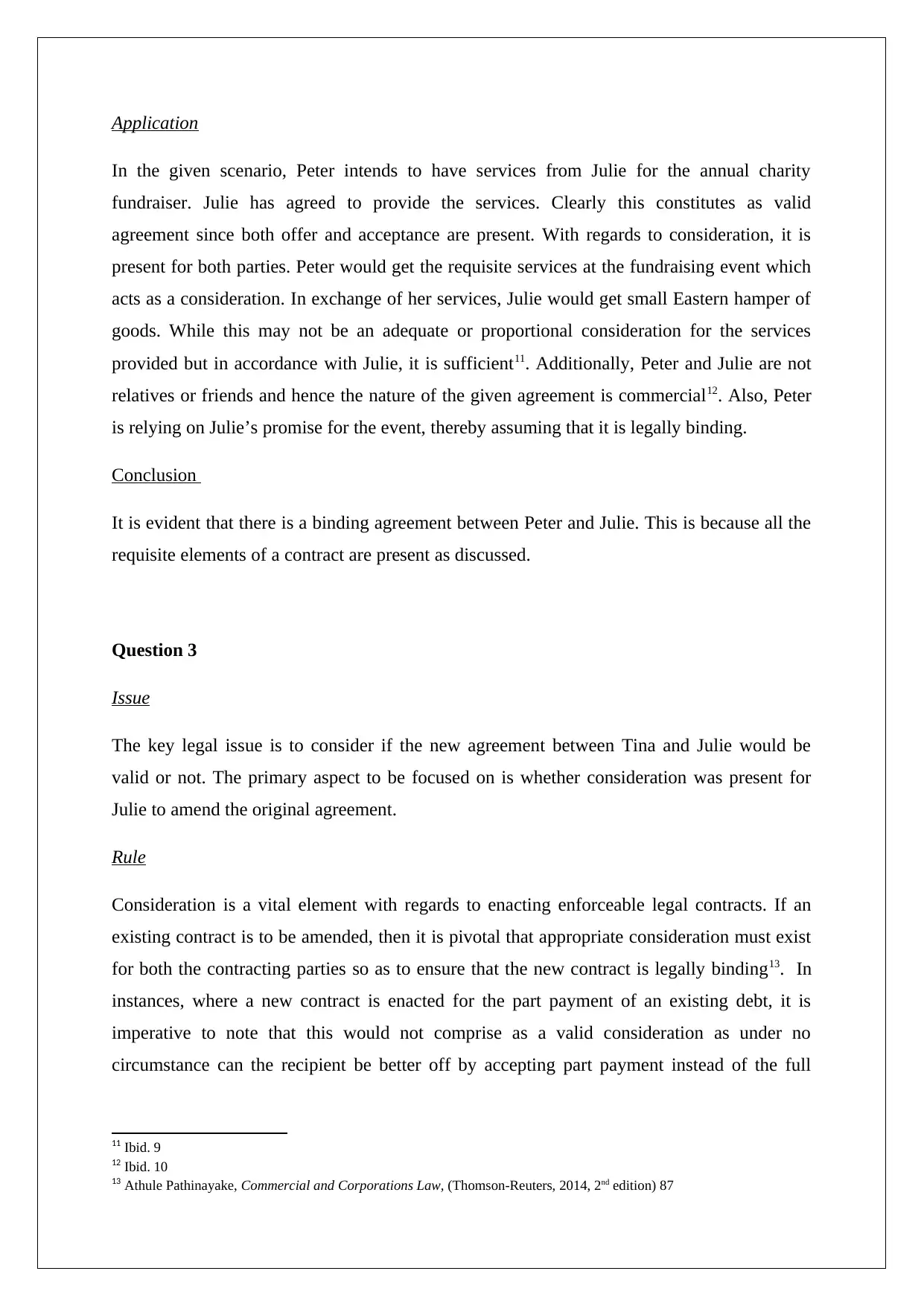
Application
In the given scenario, Peter intends to have services from Julie for the annual charity
fundraiser. Julie has agreed to provide the services. Clearly this constitutes as valid
agreement since both offer and acceptance are present. With regards to consideration, it is
present for both parties. Peter would get the requisite services at the fundraising event which
acts as a consideration. In exchange of her services, Julie would get small Eastern hamper of
goods. While this may not be an adequate or proportional consideration for the services
provided but in accordance with Julie, it is sufficient11. Additionally, Peter and Julie are not
relatives or friends and hence the nature of the given agreement is commercial12. Also, Peter
is relying on Julie’s promise for the event, thereby assuming that it is legally binding.
Conclusion
It is evident that there is a binding agreement between Peter and Julie. This is because all the
requisite elements of a contract are present as discussed.
Question 3
Issue
The key legal issue is to consider if the new agreement between Tina and Julie would be
valid or not. The primary aspect to be focused on is whether consideration was present for
Julie to amend the original agreement.
Rule
Consideration is a vital element with regards to enacting enforceable legal contracts. If an
existing contract is to be amended, then it is pivotal that appropriate consideration must exist
for both the contracting parties so as to ensure that the new contract is legally binding13. In
instances, where a new contract is enacted for the part payment of an existing debt, it is
imperative to note that this would not comprise as a valid consideration as under no
circumstance can the recipient be better off by accepting part payment instead of the full
11 Ibid. 9
12 Ibid. 10
13 Athule Pathinayake, Commercial and Corporations Law, (Thomson-Reuters, 2014, 2nd edition) 87
In the given scenario, Peter intends to have services from Julie for the annual charity
fundraiser. Julie has agreed to provide the services. Clearly this constitutes as valid
agreement since both offer and acceptance are present. With regards to consideration, it is
present for both parties. Peter would get the requisite services at the fundraising event which
acts as a consideration. In exchange of her services, Julie would get small Eastern hamper of
goods. While this may not be an adequate or proportional consideration for the services
provided but in accordance with Julie, it is sufficient11. Additionally, Peter and Julie are not
relatives or friends and hence the nature of the given agreement is commercial12. Also, Peter
is relying on Julie’s promise for the event, thereby assuming that it is legally binding.
Conclusion
It is evident that there is a binding agreement between Peter and Julie. This is because all the
requisite elements of a contract are present as discussed.
Question 3
Issue
The key legal issue is to consider if the new agreement between Tina and Julie would be
valid or not. The primary aspect to be focused on is whether consideration was present for
Julie to amend the original agreement.
Rule
Consideration is a vital element with regards to enacting enforceable legal contracts. If an
existing contract is to be amended, then it is pivotal that appropriate consideration must exist
for both the contracting parties so as to ensure that the new contract is legally binding13. In
instances, where a new contract is enacted for the part payment of an existing debt, it is
imperative to note that this would not comprise as a valid consideration as under no
circumstance can the recipient be better off by accepting part payment instead of the full
11 Ibid. 9
12 Ibid. 10
13 Athule Pathinayake, Commercial and Corporations Law, (Thomson-Reuters, 2014, 2nd edition) 87
Secure Best Marks with AI Grader
Need help grading? Try our AI Grader for instant feedback on your assignments.
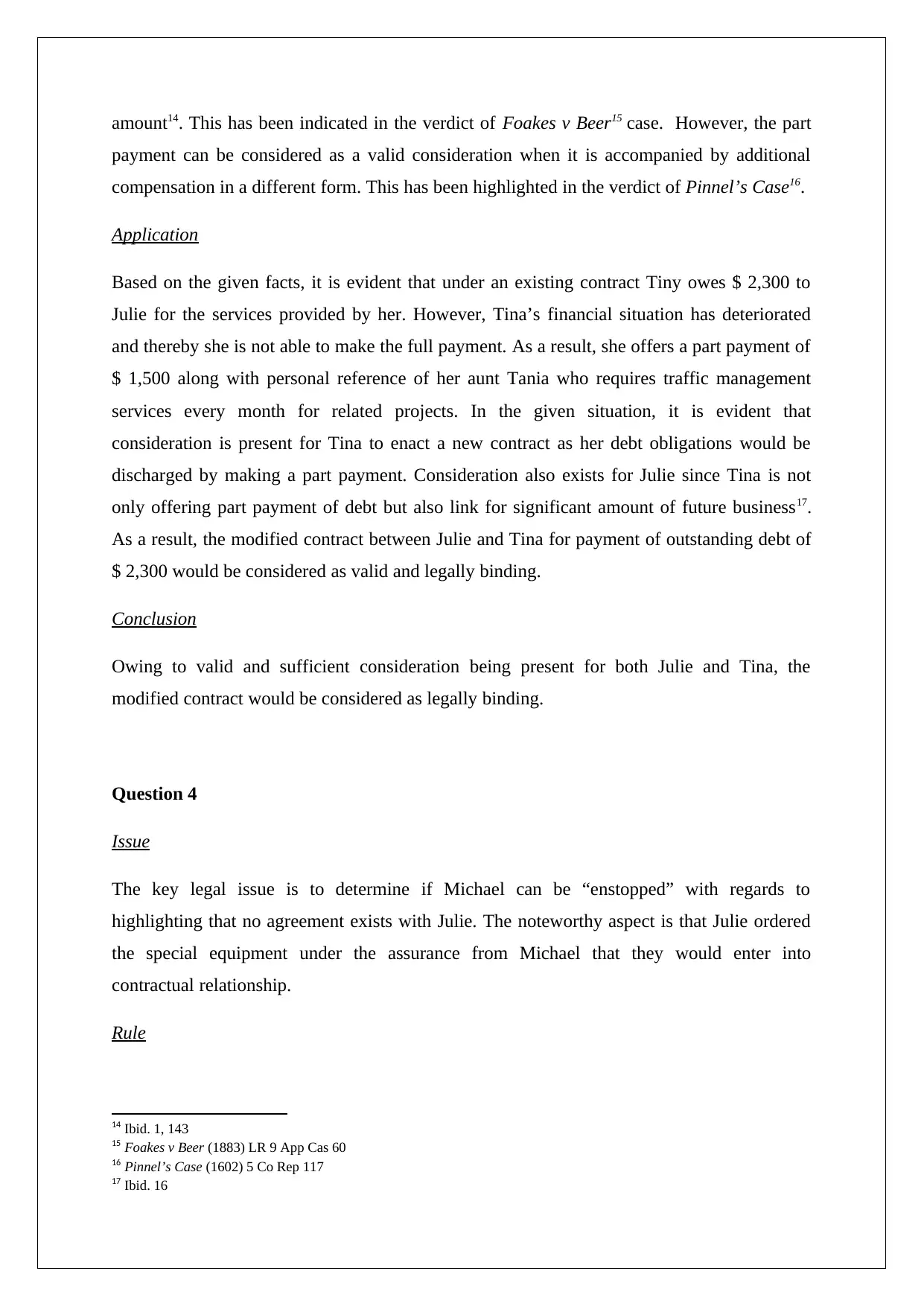
amount14. This has been indicated in the verdict of Foakes v Beer15 case. However, the part
payment can be considered as a valid consideration when it is accompanied by additional
compensation in a different form. This has been highlighted in the verdict of Pinnel’s Case16.
Application
Based on the given facts, it is evident that under an existing contract Tiny owes $ 2,300 to
Julie for the services provided by her. However, Tina’s financial situation has deteriorated
and thereby she is not able to make the full payment. As a result, she offers a part payment of
$ 1,500 along with personal reference of her aunt Tania who requires traffic management
services every month for related projects. In the given situation, it is evident that
consideration is present for Tina to enact a new contract as her debt obligations would be
discharged by making a part payment. Consideration also exists for Julie since Tina is not
only offering part payment of debt but also link for significant amount of future business17.
As a result, the modified contract between Julie and Tina for payment of outstanding debt of
$ 2,300 would be considered as valid and legally binding.
Conclusion
Owing to valid and sufficient consideration being present for both Julie and Tina, the
modified contract would be considered as legally binding.
Question 4
Issue
The key legal issue is to determine if Michael can be “enstopped” with regards to
highlighting that no agreement exists with Julie. The noteworthy aspect is that Julie ordered
the special equipment under the assurance from Michael that they would enter into
contractual relationship.
Rule
14 Ibid. 1, 143
15 Foakes v Beer (1883) LR 9 App Cas 60
16 Pinnel’s Case (1602) 5 Co Rep 117
17 Ibid. 16
payment can be considered as a valid consideration when it is accompanied by additional
compensation in a different form. This has been highlighted in the verdict of Pinnel’s Case16.
Application
Based on the given facts, it is evident that under an existing contract Tiny owes $ 2,300 to
Julie for the services provided by her. However, Tina’s financial situation has deteriorated
and thereby she is not able to make the full payment. As a result, she offers a part payment of
$ 1,500 along with personal reference of her aunt Tania who requires traffic management
services every month for related projects. In the given situation, it is evident that
consideration is present for Tina to enact a new contract as her debt obligations would be
discharged by making a part payment. Consideration also exists for Julie since Tina is not
only offering part payment of debt but also link for significant amount of future business17.
As a result, the modified contract between Julie and Tina for payment of outstanding debt of
$ 2,300 would be considered as valid and legally binding.
Conclusion
Owing to valid and sufficient consideration being present for both Julie and Tina, the
modified contract would be considered as legally binding.
Question 4
Issue
The key legal issue is to determine if Michael can be “enstopped” with regards to
highlighting that no agreement exists with Julie. The noteworthy aspect is that Julie ordered
the special equipment under the assurance from Michael that they would enter into
contractual relationship.
Rule
14 Ibid. 1, 143
15 Foakes v Beer (1883) LR 9 App Cas 60
16 Pinnel’s Case (1602) 5 Co Rep 117
17 Ibid. 16
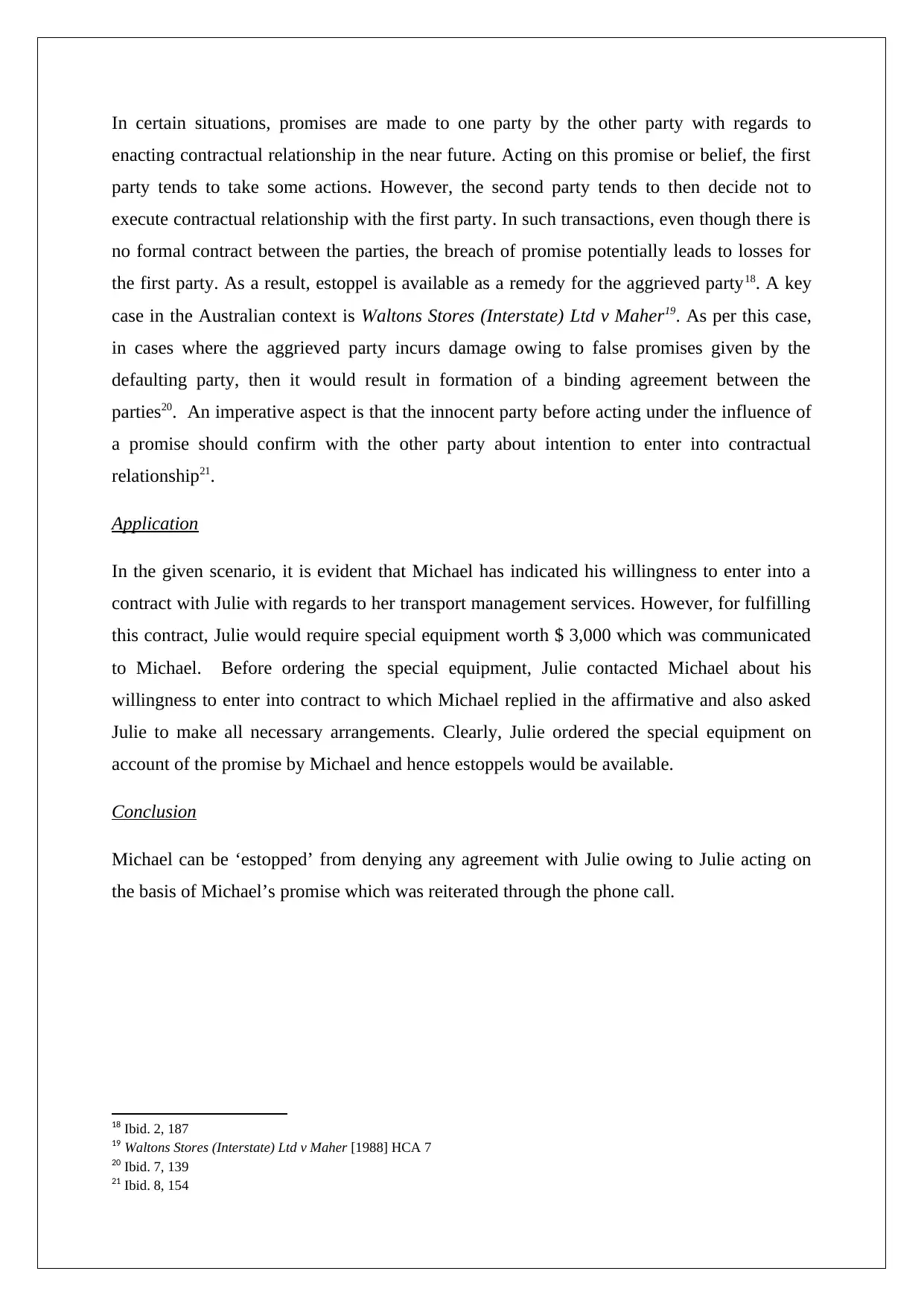
In certain situations, promises are made to one party by the other party with regards to
enacting contractual relationship in the near future. Acting on this promise or belief, the first
party tends to take some actions. However, the second party tends to then decide not to
execute contractual relationship with the first party. In such transactions, even though there is
no formal contract between the parties, the breach of promise potentially leads to losses for
the first party. As a result, estoppel is available as a remedy for the aggrieved party18. A key
case in the Australian context is Waltons Stores (Interstate) Ltd v Maher19. As per this case,
in cases where the aggrieved party incurs damage owing to false promises given by the
defaulting party, then it would result in formation of a binding agreement between the
parties20. An imperative aspect is that the innocent party before acting under the influence of
a promise should confirm with the other party about intention to enter into contractual
relationship21.
Application
In the given scenario, it is evident that Michael has indicated his willingness to enter into a
contract with Julie with regards to her transport management services. However, for fulfilling
this contract, Julie would require special equipment worth $ 3,000 which was communicated
to Michael. Before ordering the special equipment, Julie contacted Michael about his
willingness to enter into contract to which Michael replied in the affirmative and also asked
Julie to make all necessary arrangements. Clearly, Julie ordered the special equipment on
account of the promise by Michael and hence estoppels would be available.
Conclusion
Michael can be ‘estopped’ from denying any agreement with Julie owing to Julie acting on
the basis of Michael’s promise which was reiterated through the phone call.
18 Ibid. 2, 187
19 Waltons Stores (Interstate) Ltd v Maher [1988] HCA 7
20 Ibid. 7, 139
21 Ibid. 8, 154
enacting contractual relationship in the near future. Acting on this promise or belief, the first
party tends to take some actions. However, the second party tends to then decide not to
execute contractual relationship with the first party. In such transactions, even though there is
no formal contract between the parties, the breach of promise potentially leads to losses for
the first party. As a result, estoppel is available as a remedy for the aggrieved party18. A key
case in the Australian context is Waltons Stores (Interstate) Ltd v Maher19. As per this case,
in cases where the aggrieved party incurs damage owing to false promises given by the
defaulting party, then it would result in formation of a binding agreement between the
parties20. An imperative aspect is that the innocent party before acting under the influence of
a promise should confirm with the other party about intention to enter into contractual
relationship21.
Application
In the given scenario, it is evident that Michael has indicated his willingness to enter into a
contract with Julie with regards to her transport management services. However, for fulfilling
this contract, Julie would require special equipment worth $ 3,000 which was communicated
to Michael. Before ordering the special equipment, Julie contacted Michael about his
willingness to enter into contract to which Michael replied in the affirmative and also asked
Julie to make all necessary arrangements. Clearly, Julie ordered the special equipment on
account of the promise by Michael and hence estoppels would be available.
Conclusion
Michael can be ‘estopped’ from denying any agreement with Julie owing to Julie acting on
the basis of Michael’s promise which was reiterated through the phone call.
18 Ibid. 2, 187
19 Waltons Stores (Interstate) Ltd v Maher [1988] HCA 7
20 Ibid. 7, 139
21 Ibid. 8, 154
1 out of 6
Related Documents
Your All-in-One AI-Powered Toolkit for Academic Success.
+13062052269
info@desklib.com
Available 24*7 on WhatsApp / Email
![[object Object]](/_next/static/media/star-bottom.7253800d.svg)
Unlock your academic potential
© 2024 | Zucol Services PVT LTD | All rights reserved.





